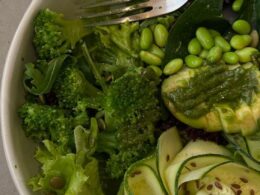When I first heard the term PCOS (polycystic ovary syndrome), it sounded like something far away: medical, complicated, not really “about me.” But PCOS is far more common than most of us realise. And for many women, it’s not something they learn about from a doctor early on, but from Google at 2 a.m., a friend’s story, or years of wondering why their body feels “off.”
If only we’d been taught about it earlier – in a way that felt clear, compassionate, and shame-free. So here’s what I wish every girl learned in school.
- PCOS is common – and no, it’s not your fault.
PCOS affects roughly 1 in 10 women of reproductive age. It’s a hormonal condition, not a personal failure or something you “caused” by eating the wrong thing or exercising too little. - It’s more than just “cysts on ovaries”
Despite the name, not everyone with PCOS has cysts. It’s actually a collection of symptoms, which may include:- Irregular periods or no periods
- Acne or oily skin
- Excess hair growth (face, chest, stomach)
- Hair thinning on the scalp
- Weight changes or difficulty losing weight
- Mood swings or anxiety
- Irregular periods or no periods
- It’s linked to insulin resistance
Many women with PCOS have higher insulin levels, which can affect hormone balance. That’s why lifestyle changes like balanced eating, stress management, and movement can make a big difference – but they’re supportive tools, not punishments. - It’s not “one-size-fits-all”
PCOS looks different for everyone. Some women have irregular cycles but no skin issues, others have acne but regular periods. Your experience is valid, even if it doesn’t match someone else’s. - You can live well with PCOS
While there’s no “cure” for PCOS, there are many ways to manage it and feel good in your body. Some of the most impactful steps include:- Eating balanced meals with protein, healthy fats, and slow carbs
- Prioritising sleep and stress reduction
- Moving your body regularly (walking, yoga, strength training)
- Working with a healthcare provider who listens to you
- Eating balanced meals with protein, healthy fats, and slow carbs
A note we should’ve heard earlier:
Your worth is not tied to your cycle, your skin, your weight, or your fertility. PCOS can be frustrating, but it doesn’t define who you are; with the right information and support, your body can still thrive.
At Yoginii, we believe women deserve honest, compassionate health education — the kind we wish we got in school. PCOS is part of the conversation, and it’s time we talk about it openly, without shame.








